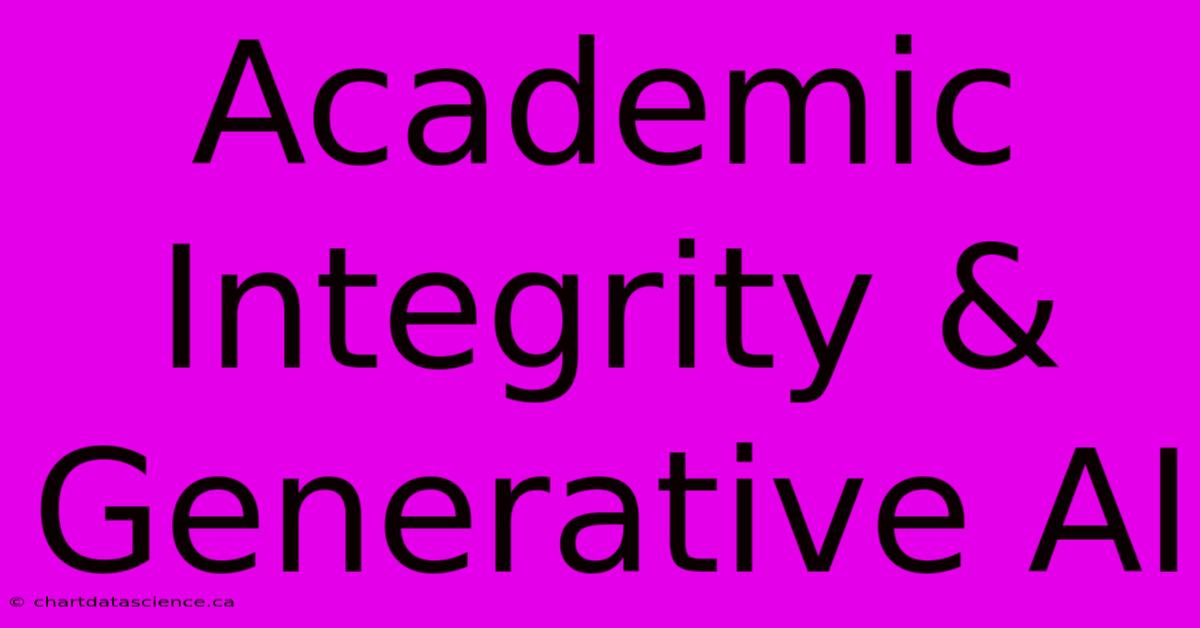Academic Integrity & Generative AI

Discover more detailed and exciting information on our website. Click the link below to start your adventure: Visit My Website. Don't miss out!
Table of Contents
Academic Integrity & Generative AI: Navigating the New Landscape
The rise of generative AI tools like ChatGPT and Bard presents both exciting opportunities and significant challenges for academic integrity. These powerful tools can assist with research and writing, but their misuse poses a serious threat to the principles of honest scholarship. This article explores the ethical considerations and practical strategies for navigating this evolving landscape.
Understanding the Challenges Posed by Generative AI
Generative AI's ability to produce human-quality text, code, and even images raises several critical concerns for academics:
1. Plagiarism:
Perhaps the most obvious challenge is the ease with which students can submit AI-generated content as their own work. This constitutes plagiarism, a serious academic offense with potentially severe consequences. Detecting AI-generated text can be difficult, requiring sophisticated plagiarism detection software and careful human review.
2. Lack of Learning:
Using AI to complete assignments undermines the core purpose of education: learning and developing critical thinking skills. Students who rely on AI bypass the crucial process of research, analysis, and synthesis, hindering their intellectual growth.
3. Authenticity and Originality:
The value of academic work lies in its originality and the unique perspective of the author. AI-generated content, while often well-written, lacks the authentic voice and personal reflection that are essential components of genuine scholarship.
4. Bias and Accuracy:
Generative AI models are trained on vast datasets, which may contain biases. This can lead to AI-generated content that perpetuates or amplifies harmful stereotypes and inaccuracies. Critically evaluating the output of AI tools is therefore crucial.
Strategies for Maintaining Academic Integrity in the Age of AI
While generative AI presents significant challenges, there are strategies to mitigate the risks and harness its potential responsibly:
1. Transparent Use of AI Tools:
Institutions and educators should establish clear guidelines on the acceptable use of AI tools in academic work. Students should be encouraged to be transparent about their use of AI, acknowledging its contribution while still demonstrating their own critical thinking and analysis.
2. Focus on the Process, Not Just the Product:
Assessing student learning should emphasize the process of research, analysis, and writing, rather than solely focusing on the final product. This can include assigning projects that require critical engagement with the source material and demonstrate original thought.
3. Developing Critical Evaluation Skills:
Educators should equip students with the skills to critically evaluate information generated by AI. This includes understanding the limitations of AI, recognizing potential biases, and verifying the accuracy of information.
4. Utilizing AI Detection Tools:
While not foolproof, AI detection tools can assist in identifying potentially AI-generated content. These tools should be used in conjunction with other assessment methods and human judgment.
5. Redesigning Assignments:
Educators can adapt assignments to minimize the potential for AI misuse. This may involve incorporating elements such as oral presentations, group projects, or assignments requiring real-world application and problem-solving.
The Future of AI and Academic Integrity
The relationship between AI and academic integrity is constantly evolving. Ongoing dialogue among educators, students, and technology developers is vital to establish ethical guidelines and effective strategies for navigating this dynamic landscape. By embracing transparency, promoting critical thinking, and adapting assessment methods, we can ensure that AI serves as a tool for enhancing learning rather than undermining academic integrity. The emphasis should always be on fostering genuine understanding and intellectual growth, rather than simply achieving a high grade.

Thank you for visiting our website wich cover about Academic Integrity & Generative AI. We hope the information provided has been useful to you. Feel free to contact us if you have any questions or need further assistance. See you next time and dont miss to bookmark.
Also read the following articles
| Article Title | Date |
|---|---|
| Chat Gpt Downtime Open Ais Fix In Progress | Dec 12, 2024 |
| 3 0 Arsenal Win Monaco Match Report | Dec 12, 2024 |
| 3 2 Victory Barcelona Defeats Dortmund | Dec 12, 2024 |
| Widespread Outage Facebook Instagram Down | Dec 12, 2024 |
| Fbi Baffled By Nj Drone Flights | Dec 12, 2024 |
